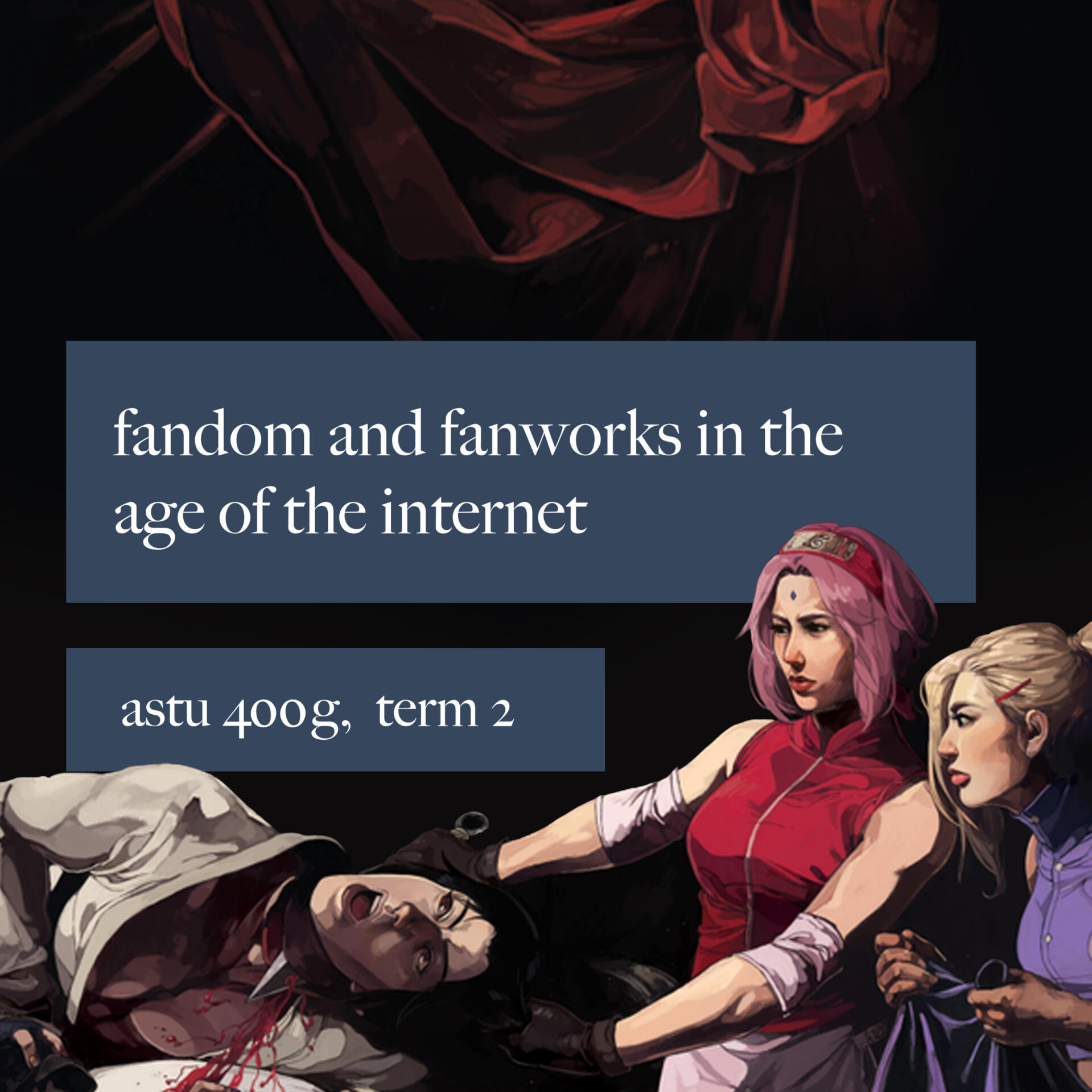astu 400g:
fandom and fanworks in the age of the internet
ubc student-directed seminar

course summary
This course surveys current internet fan culture, analyzing fanart, fan fiction, fan videos, cosplay, and online fan spaces in the context of gender studies, critical theory, queer theory, sociology, and other critical discourses.
The aim is to understand fan works: their relationships with the original works, with each other, with their fan audiences.
Questions this course will pose include; what is a fanwork? Why do people create fanworks? What is a fan? What is a fanwork's relationship with its text of origin? Are fanworks queer art? Are fanworks anti-capitalist art? Is creating a fanwork a political act? What is the relationship between fanworks and children's literature? How do fanworks represent and discuss the body?
This course is a student-directed seminar. A student-directed seminar is run by a student coordinator, but not instructed by them. These courses are democratic, discussion-based seminars run cooperatively by all students.
Student participants have a role in shaping many aspects of the course - from helping to edit the course syllabus and choose readings, to peer marking, facilitating learning activities, and leading individual classes. Each student will build their own learning experience, and contributes to the learning outcomes for their peers.
faculty sponsor and student coordinator

Olivia Brocklehurst will be the student coordinator. She is a 4th year student, studying History and Medieval Studies.
Her role is to direct the seminar (not instruct it).

Dr Rick Gooding will be the faculty sponsor. He teaches courses on Children’s and Young Adult Literature, Restoration and Eighteenth-Century Literature, and writing. His research "focuses on children’s and young adult fiction, and [he's] especially interested in how contemporary writing for the young represents posthuman challenges to liberal humanist models of the self." He will be generally overseeing the seminar and assisting with marking.
information for registration
The course is running in term 2, from January to April 2021.It meets Tuesdays and Thursdays, from 2pm to 3:30 PM.This course is restricted to students in year: >=3You cannot register directly through the SSC: you must submit a statement of intent to [email protected]. You may be approved for registration based on your submitted statement. More information on the statement of intent is below.
assignments and marks
10% Participation
regular attendance, contribution in discussion
30% direction of seminars
choosing topic, curating reading, creating short presentation and discussion questions Short paper or proposal collecting sources, explaining their choice of topic, and summarizing their approach and discussion This will encourage the students to think seriously about their topic, and drive their engagement in other seminar discussions in the term, as it will give them a strong basis of knowledge which they can refer to. This will test student’s breadth of knowledge on a topic, their presentation skills, and their ability to drive and foster discussion
20% Creation of a fanwork and related explanation
Fanfiction, fanart, fanvideo, or other fanwork (based off any text) Presentation to the class, short paper explaining thought process, connections to topics explored in course This assignment allows students to use skills they would not usually bring into an academic setting- art, creative writing, etc. It will encourage students to seriously consider the topics we’ve studied, and their real-life applicability, as well as their own personal relationship to fan culture and the works they are a fan of.
40% End-semester paper
Serious academic paper exploring topic of student’s choice relating to seminar, 3000 words. Research, writing ability, creating and structuring an original argument. This paper will test the students’ understanding of the themes we’ve explored over the course of the class, and their engagement with the discipline of fan studies. There will be opportunities during classes to discuss and get feedback on work.
These assignments will be marked collectively by the other students, with the exception of the end-semester paper, which will be marked both by the students and by the faculty sponsor.
outline for the first two weeks
I will be running the first four seminars. Following this, the students will share seminar leadership roles equally, and can select their own topics and readings.
| SEMINAR 1: Overview of fans and fanworks throughout history | In this seminar I want to provide students with a general summary of the history of fandom, and the history of its study, so we are all on the same page to begin our discussions. I want to compare and contrast between the early roots of fandom and it’s current online iterations. As well, I want to look at current online fandom, and how the online format shapes fan cultures, as opposed to how analog formats shaped fandom in earlier decades. What does being a fan mean now? |
| SEMINAR 2: What is a fanwork? | In this seminar, I want to discuss the concept of fandom, and fan-created content- media created with explicit reference to another text, usually for consumption for other fans. However, I want to expand and question the idea of ‘fan works’, and explore the intertextual and interconnected nature of all modern cultural product. If all work is created with reference, intentional or not, to other work, are all texts fan texts? How have previous authors repurposed material for their own context and use- are they fans? |
| SEMINAR 3: Fanworks and their relationship to a text | In this seminar I want to discuss Henry Jenkins’s essay, Textual Poachers, and it’s inspirations, De Certeau and Barthes. I want to look at how Jenkins conceptualizes the relationship between the reader or fan, and the text they ‘poach’ from to create their own meaning. How does this one-way relationship between ‘dead’ author and active reader occur in fanworks, and is it always that simple? |
| SEMINAR 4: Fanworks as ‘legitimate’ | I want to look at the ideas usually connected with academic study- objective analysis, good taste- and how fandom, itself another kind of study, challenges this. The narratives surrounding fans- hysterics, outcasts- how did they come to exist, and why? Is fandom legitimate engagement with a text? As we move away from the fantasy of the purely objective critic, how does fandom come into play? When Jenkins, Penley, Bacon-Smith, and others label themselves ‘aca-fans’, or academic fans, what are they doing? |
submitting a statement of intent
To apply for this course, you must submit a statement of intent.
In 200 words or less, please submit a statement of intent that addresses the following:
Your motivation and interest in taking this seminar. Why do you want to take it?Why you are well-suited for a dynamic discussion based course like this one- may include past experiences in a peer leadership role, other experiences in academic courses engaging deeply with a topic, etc. Why would you be an asset to the class?Your program of study and any previous history with fandom/fanworks/fan culture (students of any level of familiarity with the topic are welcome to apply: this information is for my own guidance when preparing the introductory seminars)
Statements can be submitted to [email protected], by September 30th, 2020.
For more information, please don't hesitate to email me at [email protected]. I would be happy to discuss any aspect of the course with you. My Twitter is @squelerious, and my DMs are open, too!
The image used in the header above, and in course materials, is Judith Beheading Holofernes by Alexis Moore. Reproduced with permission from the artist. Find her on Twitter at @alexisparade.